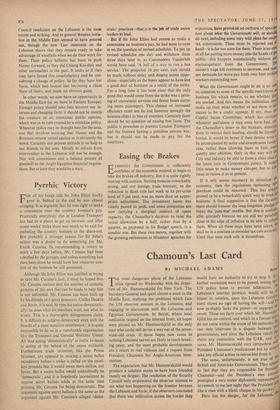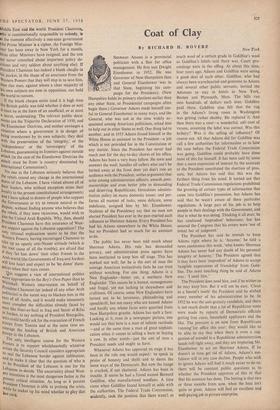Chamoun's Last Card
By MICHAEL ADAMS TFritte most dangerous phase of the Lebanese crisis opened on Wednesday with the depar- ture of Mr. Hammarskjold for New York. The Secretary-General had spent almost a week in the Middle East, studying the problems which face the UN observer mission in the Lebanon, and engaging in discussions with the Lebanese and Egyptian Governments. In Beirut, where total confusion reigned on the internal front, all hopes were pinned on Mr. Hammarskjold as the only man who could still devise a way out of the seven- week-old crisis. If those hopes now come to nothing Lebanese nerves are likely to reach break- ing point, and the most probable developments are a resort to real violence and a request from President Chamoun for Anglo-American inter- vention.
The expectation that Mr. Hammarskjold would produce a solution seems to have been founded mostly on despair. The resolution of the Security Council only empowered the observer mission to see what was happening on the frontier between the Lebanon and Syria; if the observers concluded that there was infiltration across the border they would have no authority to try to stop it. if a further resolution were to be passed, setting UP° UN police force to prevent infiltration, the Lebanon's internal problem would still be ea nearer to solution, since the Lebanese Govern ment shows'no sign of having the will—and l' now probably lacks the power—to suppress the revolt. These are facts over which Mr. Hammers; kjold has no control, and which in a formal see,s; do not come within the scope of his authority. Po can only intervene in a dispute between tvi, governments, and since the Lebanese rebels d! s; claim any • connection with the UAR, and victi versa, Mr. Hammarskjold may sympathise Witt President Chamoun's predicament but he cane° take any official action to rescue him from it. ,.e The same, unfortunately, is not true of ttir British and American Governments. They aPPefit to feel that they are responsible for Preside; Chamoun—and the President's own attitude prompted a very senior diplomatic representative sets like remark to me last night that 'the President se'0 like a man with a blank cheque in his pocket. Here lies the danger, for the Lebanon, 4 THE SPECTATOR, JUNE 27, 1958 Middle East and the world. President Chamoun, Who is constitutionally responsible to nobody, is at the moment effectively a one-man government (the Prime Minister is a cipher, the Foreign Min- ister has been away in New York for a month, three other Ministers have resigned, and the rest are never consulted about important policy de- cisions and very seldom about anything else). If President Chamoun has indeed a blank cheque in his pocket, in the shape of an assurance from the Western Powers that they will step in to save him, then this man, against whom a clear majority of his own subjects are now in opposition, can hold the world to ransom.
If the blank cheque exists (and it is high time the British public was told whether it does or not) tt must be in the form of an unofficial, or at most a secret, undertaking. The relevant public docu- ments are the Tripartite Declaration of 1950, and the Eisenhower Doctrine, and neither envisages a situation where a government is in danger of being overthrown by its own subjects; they deal with the preservation of the 'integrity,' or the `independence' or the 'sovereignty' of the Lebanon, guaranteeing its frontiers against outside attack (in the case of the Eisenhower Doctrine the attack must be from 'a country dominated by international Communism'). No one in the Lebanon seriously believes that the rebels intend any change in the international status of the Lebanon. I have visited almost all of their leaders, who without exception stress their InYalty to the present constitutional arrangements; and I have talked to dozens of people who support the Government or try to remain neutral in the dispute, without finding anyone who believes that the rebels, if they were victorious, would wish to join the United Arab Republic. Why, then, should President Chamoun have this assurance of West- ern support against the Lebanese opposition? The Western rational explanation seems to be that the western Powers, having encouraged Chamoun to !Lake uP an openly anti-Nasser attitude (which is the root cause of all the trouble), are afraid that if they 'let him down' their other friends in the Arab world (the Governments of Iraq and Jordan) Will lose heart and expect to be 'let down' them- selves when their turn comes. Tjiis suggests a view of international politics more appropriate to the Boy's Own Paper than to President Western intervention on behalf of President Chamoun (or indeed of any other Arab Politician) is the surest way to blacken him in the eYes of all Arabs, and it would make immensely more complex the difficulties already faced by The like Nuri-es-Said in Iraq and Samir el-Rifai in Jordan; to say nothing of President Bourguiba, w. he' could hardly ask for the evacuation of French troops from Tunisia and at the same time en- et — ourage the landing of British and American troops in the Lebanon. The only intelligent course for the Western Powers is to support wholeheartedly whatever to seal the Security Council considers appropriate t a° seal the Lebanese border against infiltration, and to make it clear that the question of who is to be President of the Lebanon is one for the Lebanese to decide. The uncertainty about West- ern intentions is the most dangerous factor in the present critical situation. As long as it persists resident Chamoun is able to prolong the crisis, last he makes up his mind whether to play that mist card.



































 Previous page
Previous page